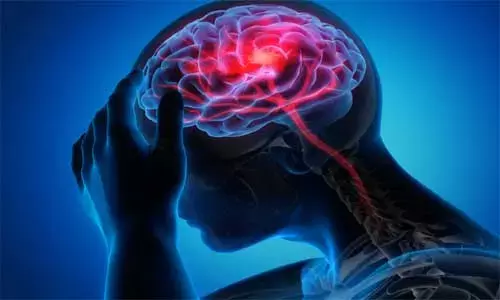- Home
- Medical news & Guidelines
- Anesthesiology
- Cardiology and CTVS
- Critical Care
- Dentistry
- Dermatology
- Diabetes and Endocrinology
- ENT
- Gastroenterology
- Medicine
- Nephrology
- Neurology
- Obstretics-Gynaecology
- Oncology
- Ophthalmology
- Orthopaedics
- Pediatrics-Neonatology
- Psychiatry
- Pulmonology
- Radiology
- Surgery
- Urology
- Laboratory Medicine
- Diet
- Nursing
- Paramedical
- Physiotherapy
- Health news
- Fact Check
- Bone Health Fact Check
- Brain Health Fact Check
- Cancer Related Fact Check
- Child Care Fact Check
- Dental and oral health fact check
- Diabetes and metabolic health fact check
- Diet and Nutrition Fact Check
- Eye and ENT Care Fact Check
- Fitness fact check
- Gut health fact check
- Heart health fact check
- Kidney health fact check
- Medical education fact check
- Men's health fact check
- Respiratory fact check
- Skin and hair care fact check
- Vaccine and Immunization fact check
- Women's health fact check
- AYUSH
- State News
- Andaman and Nicobar Islands
- Andhra Pradesh
- Arunachal Pradesh
- Assam
- Bihar
- Chandigarh
- Chattisgarh
- Dadra and Nagar Haveli
- Daman and Diu
- Delhi
- Goa
- Gujarat
- Haryana
- Himachal Pradesh
- Jammu & Kashmir
- Jharkhand
- Karnataka
- Kerala
- Ladakh
- Lakshadweep
- Madhya Pradesh
- Maharashtra
- Manipur
- Meghalaya
- Mizoram
- Nagaland
- Odisha
- Puducherry
- Punjab
- Rajasthan
- Sikkim
- Tamil Nadu
- Telangana
- Tripura
- Uttar Pradesh
- Uttrakhand
- West Bengal
- Medical Education
- Industry
Low-Dose Edoxaban prevents stroke in elderly AF patients without bleeding risk: NEJM

Japan: A once-daily low dose (15mg) of anticancer drug edoxaban may prevent stroke or systemic embolism without increasing the risk of major bleeding in patients 80 years and above with atrial fibrillation.
The recent ELDERCARE-AF trial published in the New England Journal of Medicine revealed that edoxaban was superior to placebo in preventing systemic embolism or stroke in very elderly Japanese patients having nonvalvular atrial fibrillation who were not suitable for standard doses of oral anticoagulant.
ENDOXAN is used in the treatment of various types of cancer. It can also be used in some diseases of the immune system, and to prevent rejection of organ transplants.
Owing to the concerns of bleeding in very elderly patients with atrial fibrillation, the implementation of appropriate oral anticoagulant treatment for stroke prevention becomes challenging. Keeping this in mind, Ken Okumura, Saiseikai Kumamoto Hospital, Kumamoto, Japan, and colleagues conducted a phase 3 study to compare the once-daily 15-mg dose of edoxaban with placebo in patients (≥80 years of age) with atrial fibrillation who were not considered appropriate for receiving oral anticoagulant therapy at doses approved for stroke prevention.
The primary efficacy endpoint was the composite of stroke or systemic embolism, and the primary safety endpoint was major bleeding according to the definition of the International Society on Thrombosis and Haemostasis.
The study involved a total of 98 patients who were assigned in the ratio of 1:1 to receive a daily dose of 15mg of edoxaban (492 patients) or placebo (492 patients). 681 patients completed the trial and 303 discontinued (135 died, 158 withdrew, and 10 had other reasons). Both groups had similar number of patients who discontinued the trial.
Key findings of the study include:
- The annualized rate of stroke or systemic embolism was 2.3% in the edoxaban group and 6.7% in the placebo group (hazard ratio, 0.34), and the annualized rate of major bleeding was 3.3% in the edoxaban group and 1.8% in the placebo group (hazard ratio, 1.87).
- There were substantially more events of gastrointestinal bleeding in the edoxaban group than in the placebo group.
- There was no substantial between-group difference in death from any cause (9.9% in the edoxaban group and 10.2% in the placebo group; hazard ratio, 0.97).
"A once-daily 15-mg dose of edoxaban was superior to placebo in preventing stroke or systemic embolism and did not result in a significantly higher incidence of major bleeding than placebo," concluded the authors.
The study, "Low-Dose Edoxaban in Very Elderly Patients with Atrial Fibrillation," is published in the journal NEJM.
Dr Kamal Kant Kohli-MBBS, DTCD- a chest specialist with more than 30 years of practice and a flair for writing clinical articles, Dr Kamal Kant Kohli joined Medical Dialogues as a Chief Editor of Medical News. Besides writing articles, as an editor, he proofreads and verifies all the medical content published on Medical Dialogues including those coming from journals, studies,medical conferences,guidelines etc. Email: drkohli@medicaldialogues.in. Contact no. 011-43720751


